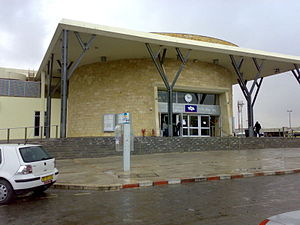
Beersheba, officially Be'er-Sheva, is the largest city in the Negev desert of southern Israel. Often referred to as the "Capital of the Negev", it is the centre of the fourth-most populous metropolitan area in Israel, the eighth-most populous Israeli city with a population of 214,162, and the second-largest city in area, with a total area of 117,500 dunams.
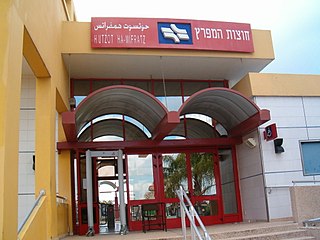
Hutzot HaMifratz railway station is an Israel Railways passenger station serving Hutzot HaMifratz Mall, Israel's largest open-air mall, and the surrounding Haifa Bay industrial zone in the north of Haifa.

Haifa Center HaShmona railway station is an Israel Railways passenger station situated on the coastal railway main line and serves the City of Haifa.
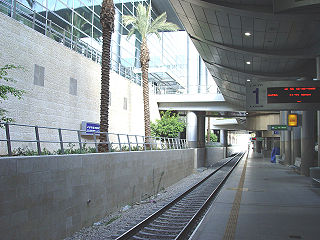
Ben Gurion Airport railway station is an Israel Railways station located in the lower level of Ben Gurion International Airport's Terminal 3. The station opened on 10 October 2004, together with the opening of Terminal 3. The railway line extending to the northwest from the station connects it to Tel Aviv and points north, while in the other direction from the station the railway splits south to Lod and southeast to Modi'in and Jerusalem.

Ramla railway station is a railway station in Ramla, Israel, on the Tel Aviv–Beit Shemesh–Jerusalem line. The station is located in the east of Ramla. The station is also on a section shared with the Be'er Sheva–Tel Aviv line, which branches out in a southerly direction about 3 km east of Ramla.
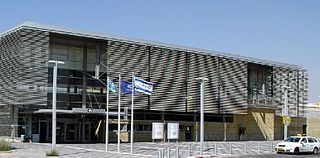
Be'er Sheva North railway station is an Israel Railways station in Beersheba. It is a stop on the intercity line from Tel Aviv and the terminus of the Beersheba - Dimona branch line.

Rail transport in Israel includes heavy rail as well as light rail. Excluding light rail, the network consists of 1,511 kilometers (939 mi) of track, and is undergoing constant expansion. All of the lines are standard gauge and as of 2023 approximately one-fifth of the heavy rail network is electrified, with additional electrification work underway. A government owned rail company, Israel Railways, manages the entire heavy rail network. Most of the network is located on the densely populated coastal plain.

Rehovot railway station is an Israel Railways station located in the city of Rehovot. It serves the city, the Weizmann Institute of Science and the nearby science industries park, as well as the city of Ness Ziona. The station is named after Ehud Hadar, CEO of Israel Railways between 1994 and 1996.

The Tel Aviv transportation system is seen as the hub of the Israeli transport network in terms of road, rail, and air transport. The Israeli road network partly centers on Tel Aviv, with some of the country's largest highways passing through or running to the city. The city forms a major part of the country's rail network, whilst Ben Gurion International Airport located near the city is the country's largest airport. There is also a strong public transport system within the city, based primarily on bus transportation.
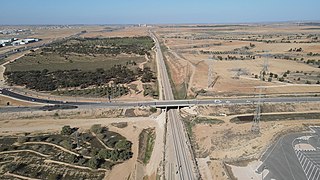
The Railway to Beersheba is a railroad line that runs from central Israel to the Zin Factories in southern Israel, with a spur to the Be'er Sheva Center Railway Station and branch lines to Ramat Hovav, the Arad phosphate mines and factories in Tzefa, and a connection to the Ashkelon–Beersheba railway. It is part of the main line of Israel Railways, of which the northern starting point of the line designated as the "line to Beersheba" is usually indicated as beginning at Na'an junction, where the railway splits to Beersheba and Jerusalem. Because the line is not limited to Beersheba, it is known in Israel as Mesilat HaDarom.
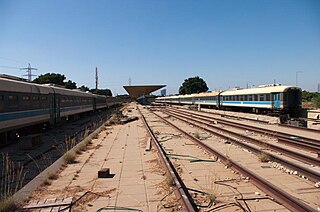
Tel Aviv South railway station was the name of two former railway stations in Tel Aviv, Israel, which were situated in two different locations. The original station opened in 1920, then in 1970 it was relocated 2.5 km south-east, and it finally closed to passengers in 1993.
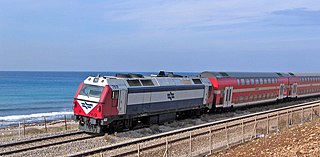
The Coastal railway line is a mainline railway in Israel, which begins just south of the Lebanon-Israel border on the Mediterranean coast, near the town of Nahariya in Northern Israel and stretches almost the entire Mediterranean coast of the country, to just north of the border with the Gaza Strip in the south.
The Israeli city of Beersheba occupies a central role in southern Israel. Because of its central position in the Negev it is situated on important national routes reaching down to the far southern port of Eilat. Be'er Sheva is also home to a population of 195,000, with an estimated metro population at over 500,000 making it one of the largest cities in Israel. Much of the cities high-tech industry is concentrated in the center of the city, with Industrial estates existing in the south of the city, both of these areas are thus extensively served.

The Rishon LeZion Moshe Dayan railway station is an Israel Railways station in Rishon LeZion. The station is located adjacent to the Moshe Dayan Interchange on the Ayalon Highway. It serves as the terminus of a new suburban passenger line serving the cities of Holon, Bat Yam, and Rishon LeZion in southern Gush Dan. Current travel time from the station to Tel Aviv HaHagana railway station is about 18 minutes.

Holon Junction railway station is a railway station on the Rosh HaAyin–Beersheba line. The station is located at the Holon Interchange which separates Tel Aviv from its southern suburb Holon.

Holon–Wolfson railway station is a railway station in the border of Holon and Jaffa in the south of Tel Aviv-Yafo Municipality, on the Rosh HaAyin–Beersheba line. The station is in the Wolfson interchange on the Ayalon Highway, nearby Wolfson Medical Center.

Bat Yam–Yoseftal railway station is a railway station on the Rosh HaAyin–Beersheba line. It is located at the Yoseftal interchange on the Ayalon Highway, on the border between Bat Yam and Holon, just south of Tel Aviv, Israel.
The High-speed railway to Eilat (Med-Red) is a proposed Israeli railway that will enable the connection of the main Israeli population centers and Mediterranean ports to the southern city of Eilat on the Red Sea coast, as well as serve commercial freight between the Mediterranean Sea and Red Sea (Eilat). The railway will spur southward from the existing rail line at Beersheba, and continue through Dimona to the Arava, Ramon Airport and Eilat, at a speed of 350 kilometers per hour (220 mph). Its length will be roughly 260 km (160 mi) of electrified double-track rail. Currently Dimona railway station is the southernmost passenger train station in Israel and the one with the least boardings/alightings.

The Ashkelon–Beersheba railway is a railway line linking Ashkelon and Beersheba operated by Israel Railways. It spans approximately 60 km of double track in the northern Negev region of southern Israel and provides rail service to the cities of Sderot, Netivot and Ofakim. The line links Beersheba, Sderot, Netivot, and Ofakim to Ashkelon and Tel Aviv.

The Rishon LeZion–Modi'in railway is a railway project under construction linking the cities of Rishon LeZion and Modi'in in central Israel. The project will form a part of Israel Railways' suburban rail network serving the Tel Aviv metropolitan area, as well as provide an east-west connection between the Tel Aviv–Ashkelon, Tel Aviv–Beersheba and Tel Aviv–Jerusalem rail corridors. The fully electrified line will be 30 km (19 mi) long, and involve the construction of two new train stations and Israel's longest railway viaduct.
